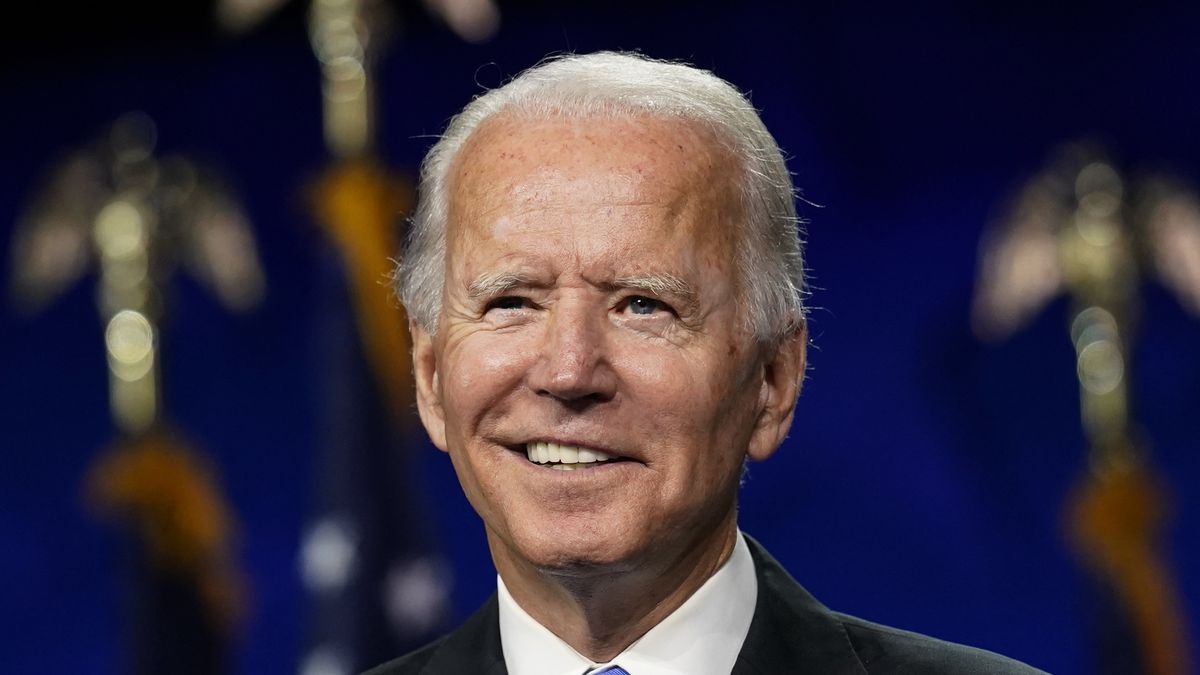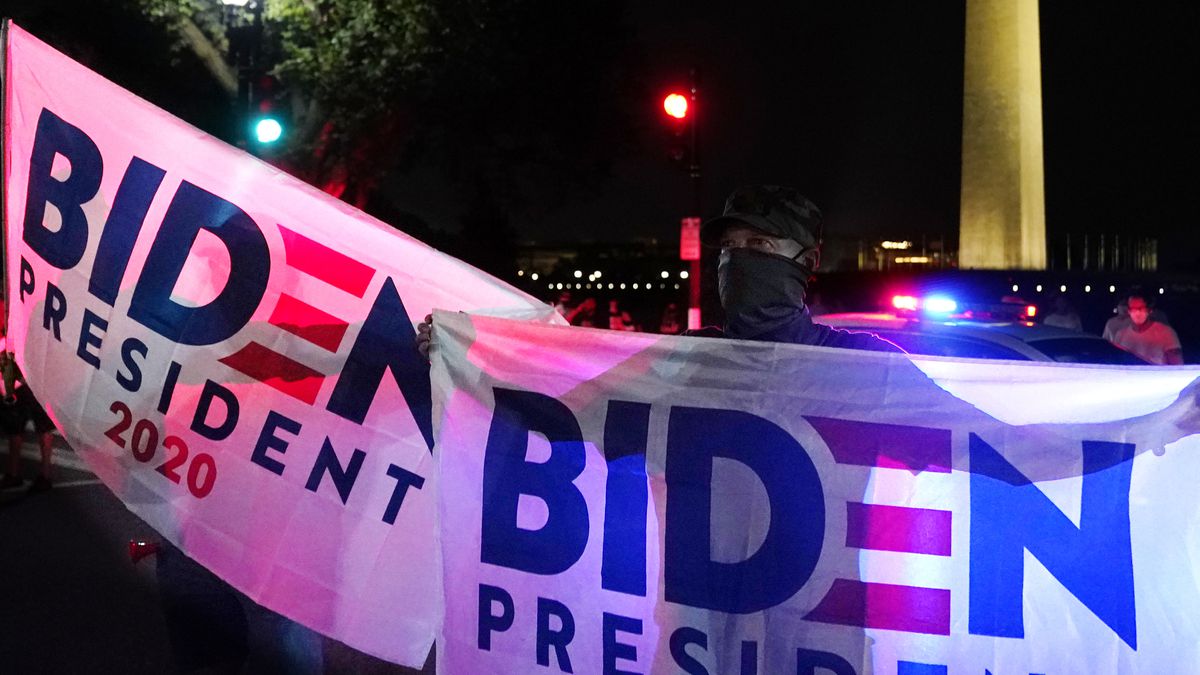
U.S. Democratic presidential candidate former Vice President Joe Biden speaks during the fourth day of the Democratic National Convention at the Chase Center in Wilmington, Delaware, the U.S., August 20, 2020. /AP
U.S. Democratic presidential candidate former Vice President Joe Biden speaks during the fourth day of the Democratic National Convention at the Chase Center in Wilmington, Delaware, the U.S., August 20, 2020. /AP
Editor's note: Bradley Blankenship is a Prague-based American journalist, political analyst and freelance reporter. The article reflects the author's opinions, and not necessarily the views of CGTN.
At the beginning of this year, it would have been difficult to imagine that tens of thousands of Americans would die due to an uncontrolled virus. Now this is reality and it appears that, as it relates to the 2020 presidential election, U.S. President Donald Trump's failure to lead on the virus response is being pushed to the periphery. The election may no longer be a referendum on Trump, but a battle for what defines the idea of America itself.
Trump is seizing on the violence that has spilled onto the streets of major cities, framing protesters as violent insurgents and his own supporters as patriots. In a series of tweets on August 30, Trump reiterated his commitment to "LAW & ORDER!!!" quite clearly, calling for a strong response in "high crime Democrat run cities" and calling out his election challenger, former vice president Joe Biden, for not being quick enough to disavow violent protests despite he and his running mate, Senator Kamala Harris, having already done so.
"When is Slow Joe Biden going to criticize the Anarchists, Thugs & Agitators in ANTIFA? When is he going to suggest bringing up the National Guard in BADLY RUN & Crime Infested Democrat Cities & States? Remember, he can't lose the Crazy Bernie Super Liberal vote!" Trump said.
The president is playing on America's racially segregated metropolitan areas to appeal to white suburban voters of middle class orientation who fear "dangerous" cities. This is the group that I referred to in a column on August 28 as the "true bulwark of America's growing fascist tendency" who have parochial attitudes on crime and are comfortable under the current American power structure.
In his tweets, Trump also pointed out that Biden, whose election strategy to this point has been about letting the president self-destruct, has seen his poll numbers slip in recent days. All things considered, this is no doubt owed in large part to events unfolding in Kenosha, Wisconsin and elsewhere around the country as people see images of cities burning and violence breaking out in what they believe to be owed to "Anarchists" aligned with Joe Biden.
Violent crime is a serious issue for many American voters – an important one for Democrats and a foundational one for Republicans. Trump is attempting to tie a spike in murders across major cities this year to the nationwide protests sparked by the unjust, extrajudicial killing of George Floyd by a white police officer. Biden's verbal support for the sentiment of the protests implicates him as a supporter of the violence allegedly caused by them, according to the Trump camp's logic.
However, this is not based in reality. Biden, in cooperation with the National Association of Police Organizations, wrote the Senate version of the Violent Crime Control and Law Enforcement Act of 1994 that became law. His running mate, Kamala Harris, was a tough-on-crime prosecutor in California for well over a decade.

Joe Biden supporters hold banners near the White House on the fourth day of the Republican National Convention, in Washington DC, while President Donald Trump delivers his acceptance speech from the nearby White House South Lawn, August 27, 2020. /AP
Joe Biden supporters hold banners near the White House on the fourth day of the Republican National Convention, in Washington DC, while President Donald Trump delivers his acceptance speech from the nearby White House South Lawn, August 27, 2020. /AP
Even as Trump attempts to frame Biden as beholden to the "radical left," the Democratic National Convention (DNC) proved how little this is true – Joe Biden and the Democratic establishment offered nothing, and will offer nothing, to those even slightly to their left.
Unfortunately for Biden, this attack line by Trump could work. George Packer, writing for the Atlantic, wrote a recent column titled "This Is How Biden Loses" that brilliantly explains this dynamic. Packer writes, "Here is a prediction about the November election: If Donald Trump wins, in a trustworthy vote, what's happening this week in Kenosha, Wisconsin, will be one reason. Maybe "the" reason. And yet Joe Biden has it in his power to spare the country a second Trump term."
According to Packer, Biden's denunciation of police brutality is loud and clear while his disavowing of the riots is hardly known by the broad public. He says, "To reach the public and convince it otherwise, Biden has to go beyond boilerplate and make it personal, memorable."
"He should speak for justice and for safety, for reform and against riots, for the crying need to bring the country together," Packer says in his conclusion.
Democrats have been reluctant to call out both sides together, fearing that it may equate the two which is understandable given that police brutality is logically the cause of the riots in the first place. The average suburbanite, however, is not interested in academic discussions of criminology nor police brutality and is primarily concerned with their own safety and that of their family; they are not politically sophisticated.
This is Biden's fundamental dilemma at this moment in the campaign – choosing between his true identity as a tough-on-crime politician, his cultivated one as a racial justice activist as the former vice president to Barack Obama, the first African American president in history, or attempting to be a unifier.
Trump is trying to force Biden to pick between the first two, criticizing Biden for the crime bill that led to the incarceration of African Americans while also attacking him for being soft on crime to appease his base. Given this, the Biden campaign must realize that wearing both of these hats at the same time could prove difficult, contrary to what Packer might think, but the choice Trump has laid out may inevitably be a false one.
The real choice is whether Biden will actually pick a side on the issue of race or craft an inspiring, unifying message for this deeply polarized moment. Can he meld law and order with police reform? However he approaches it, Biden must do it with gusto or risk losing it all.
(If you want to contribute and have specific expertise, please contact us at opinions@cgtn.com.)